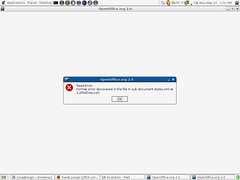Over the past several days, I’ve been a bit heads down on a project for one of our newer clients helping to create some marketing materials. One of the pieces of that project is a written deliverable, and the first draft of this deliverable was due today. Despite having a rather heavy tracel and work schedule last week, I managed to wrestle the document into a state in which I could at least get some feedback/input from my colleague.
Taking advantage of the time zone differential between Denver and London, James processed the document in the morning his time, and when I opened my laptop first thing this morning I was delighted to see a reply from him with a revised and updated attachment (I would have used Writely, but I wrote most of it on planes over the weekend). Because RedMonk’s a cross-platform shop (I’m on Linux, Cote’s on OS X, and James is on Windows XP), the Open Document Format makes the most sense for us – for offline pubs, anyway. This deliverable was no exception, and the version I’d created was ODF and that’s what he returned to me.
Unfortunately, his version of Star Office / Open Office somehow corrupted the file on save. The edited version that he sent me this morning would not open, returning me the message pictured. When I first pinged him, I was holding out hope that it was simply a transmission error in email, or some other error on my side, but he quickly reported back that his version of the file was no more readable than mine.
This was most definitely bad news, given that today was a due date and I needed that feedback. Needless to say, James and I were both quite disappointed in Open Office / Star Office. Before throwing in the towel, however, and resigning myself to losing James’ work I had a quick turn around the web via Google, turning up this link among others.
That link validated my initial instinct, which was to unzip the file, decomposing it into its individual piece parts. Unlike the current Office binary file format, but like Microsoft’s next generation Office Open XML Formats, ODF files are simply zipped containers holding individual XML sub-components. Sure enough, once I broke the file up into pieces, I was able to recover James’ version which was contained within the content.xml file. Stripping that file of its ODF markup was not a trivial exercise, but at least we didn’t lose the work.
So OO.o/SO get a thumbs down for the day’s work, while ODF gets a thumbs up.


Bill de hOra says:
March 27, 2006 at 4:16 pm
Why just last week…
an Oo file I received wouldn’t open in either 1.x or 2.x. It was a techspec with feedback comments. 10 minutes later I had the comments pulled out and recovered. Gotta love it. I think the only way to really lose ODF data is to erase it from your harddrive.
Solveig Haugland says:
March 28, 2006 at 3:33 am
Sorry to hear about the corruption. I’ve never had that happen, myself, so have no input as to what caused that. But the ODF format really does rock, as you say.
It would be nice if some open source programmer with time on his or her hands could write a nice easy-looking GUI recovery program that would unzip the file without someone actually having to know to unzip and how to do it. I can’t do it of course, myself, not being a programmer, but it doesn’t stop me from making suggestions for anyone else who might be reading. ;>
James Governor's MonkChips says:
March 28, 2006 at 4:30 am
On ODF, OpenOffice and RedMonk as a three man, three platform, three timezone shop
Great post yesterday about ODF and distributed team-working by Stephen. Taking advantage of the time zone differential between Denver and London, James processed the document in the morning his time, and when I opened my laptop first thing this morning…
Sam Hiser says:
March 28, 2006 at 3:21 pm
Stephen-
We encountered doc corruption with beta versions of OOo2 and sharing docs across different builds of OOo — such as Windows to Ubuntu (a Deb build which was quite different than some others). Never knew what it was, but the frustration is real. The only way we overcame the issues with confidence was to habitually send PDFs unless we knew for sure the edits were necessary. Writely solves most of this.
Sam Hiser says:
March 28, 2006 at 3:23 pm
Manual uzip is a good suggestion from Solveig for the Accidental Tech Support people who find themselves with the challenge.